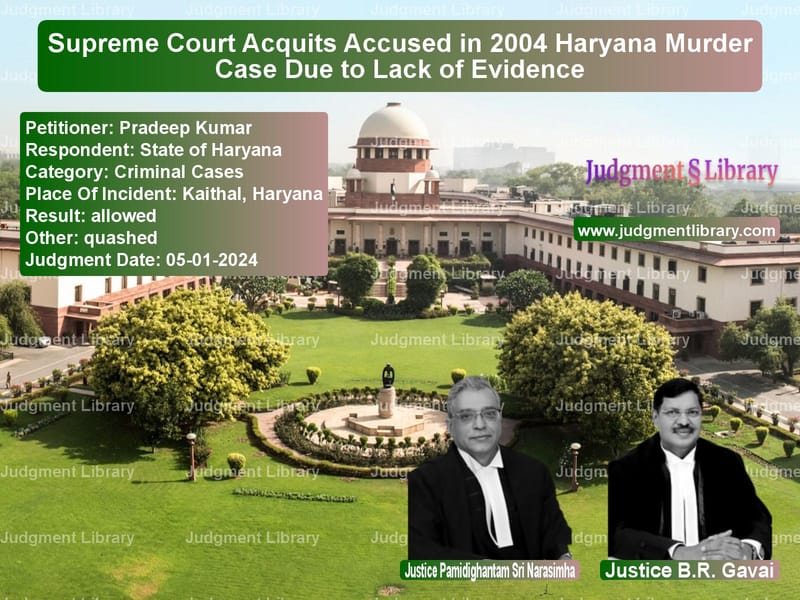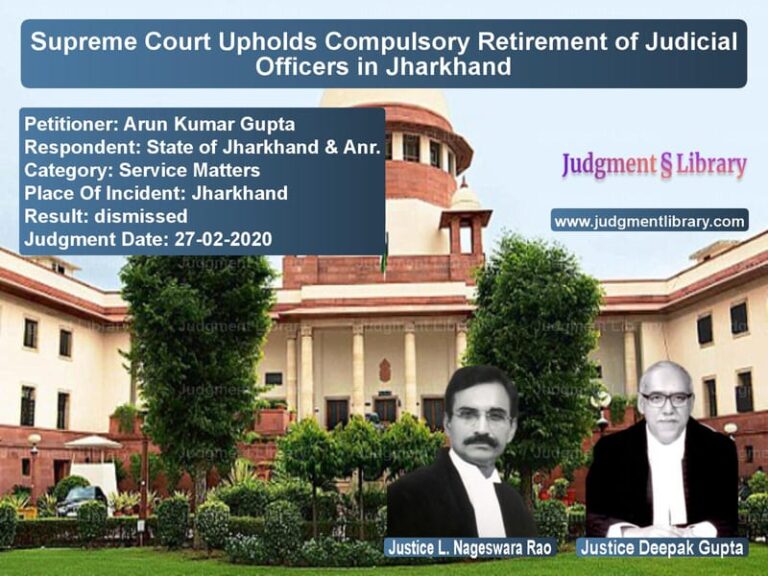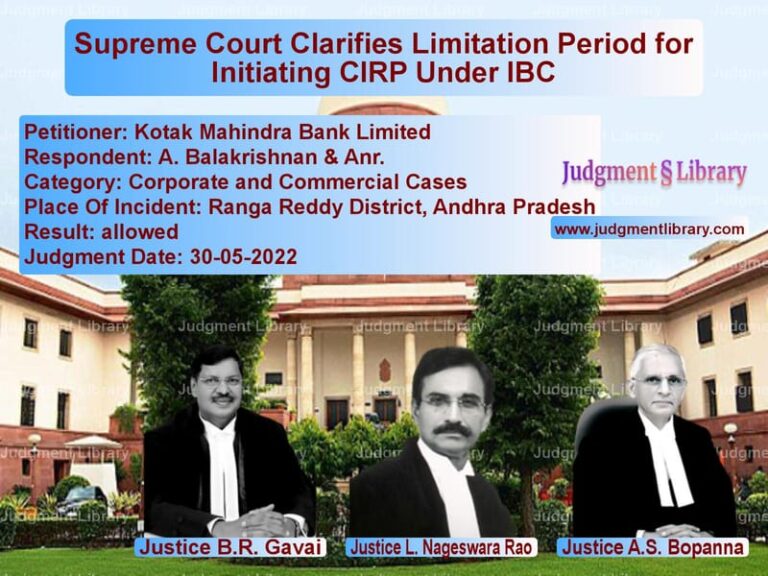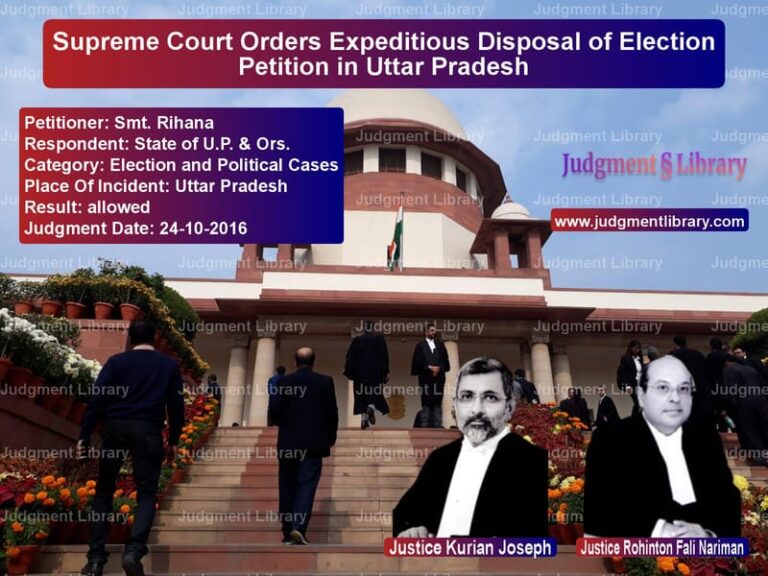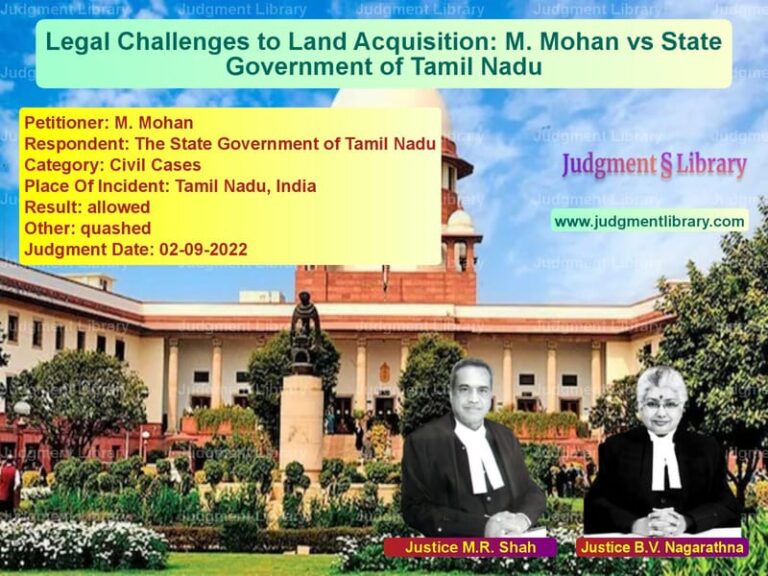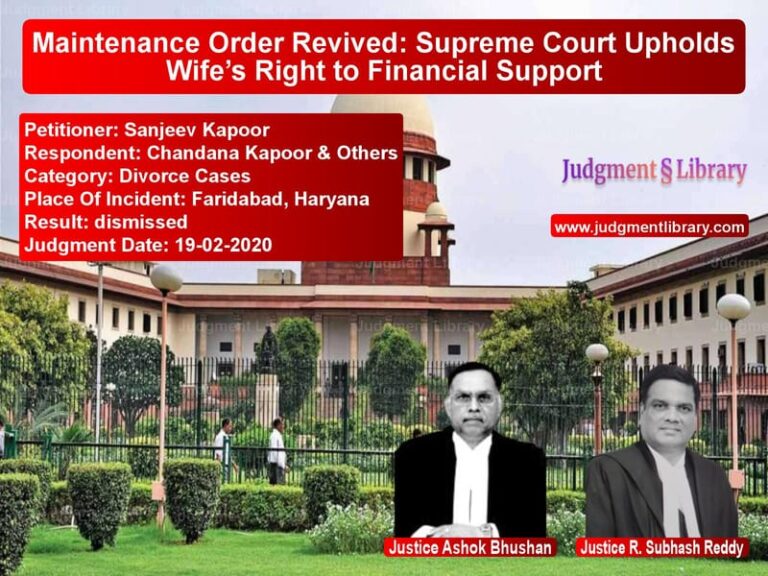Supreme Court Acquits Accused in 2004 Haryana Murder Case Due to Lack of Evidence
The Supreme Court of India, in its judgment dated January 5, 2024, acquitted Pradeep Kumar, the appellant, in the murder case of Samsher Singh. The Court found that the prosecution failed to establish the guilt of the accused beyond reasonable doubt and emphasized the importance of corroborated circumstantial evidence in criminal cases. The acquittal was based on inconsistencies and contradictions in the testimonies of the prosecution witnesses, particularly those who had testified to having seen the accused with the deceased.
Background of the Case
The case revolves around the murder of Samsher Singh, which occurred on April 10, 2004, in the Kaithal district of Haryana. The prosecution alleged that Pradeep Kumar and Sumit Gupta, along with two other accomplices, killed Samsher Singh due to a financial dispute. The witnesses claimed to have seen the accused with the victim on the night of the incident, and the prosecution relied on circumstantial evidence, including extra-judicial confessions, witness testimony, and forensic evidence.
Read also: https://judgmentlibrary.com/supreme-court-upholds-summoning-of-police-officers-in-corruption-case/
Initially, the Trial Court convicted Pradeep Kumar under Section 302 read with Section 34 of the Indian Penal Code (IPC) for the murder of Samsher Singh. The judgment was upheld by the High Court, which dismissed the appeal. Pradeep Kumar then approached the Supreme Court, seeking acquittal on the grounds of insufficient evidence and unreliable witness testimonies.
Key Legal Issues
- Whether the circumstantial evidence and witness testimonies were sufficient to prove the guilt of the accused beyond reasonable doubt.
- Whether the extra-judicial confession made by the accused could be relied upon in the absence of corroborative evidence.
- Whether the inconsistencies in the testimonies of the prosecution witnesses weakened the case against the accused.
Petitioner’s Arguments (Pradeep Kumar)
Pradeep Kumar, represented by his counsel, argued that:
- The evidence presented by the prosecution, particularly the eyewitness testimony, was inconsistent and unreliable.
- The extra-judicial confession made by the accused to the Sarpanch was inadmissible due to the absence of independent witnesses.
- The contradictions in the prosecution’s case, including the different versions given by witnesses, raised doubts about the authenticity of the charges.
- There was no direct evidence to link Pradeep Kumar to the murder, and the circumstantial evidence was insufficient to sustain the conviction under Section 302 IPC.
Respondent’s Arguments (State of Haryana)
The State of Haryana, represented by its counsel, argued that:
- The circumstantial evidence, including the extra-judicial confession and the testimony of key witnesses, established the guilt of the accused beyond reasonable doubt.
- The witnesses who saw the accused with the deceased and the recovery of blood-stained weapons were critical pieces of evidence supporting the prosecution’s case.
- The trial court’s findings, based on the corroborated statements of prosecution witnesses, should be upheld as they were consistent and reliable.
Supreme Court’s Observations
The Supreme Court carefully reviewed the case, focusing on the reliability of the prosecution’s evidence and the consistency of witness testimonies.
1. Inconsistencies in Eyewitness Testimonies
“The evidence of the eyewitnesses is fraught with contradictions, and the prosecution failed to establish a clear and consistent narrative of the events leading up to the murder.”
The Court noted that several witnesses who claimed to have seen the accused with the deceased contradicted each other on critical details, weakening their credibility.
2. Extra-Judicial Confession and Its Reliability
“The extra-judicial confession made before the Ex-Sarpanch is inadmissible as it lacks corroboration from independent witnesses and should not be relied upon to convict the accused.”
The Court emphasized that extra-judicial confessions, especially when not supported by independent witnesses, carry little evidentiary value and should be treated with caution.
3. Circumstantial Evidence
“Circumstantial evidence must be complete and conclusive, and it should exclude every other possible hypothesis. In this case, the evidence presented does not sufficiently link the accused to the crime.”
The Court noted that the circumstantial evidence provided by the prosecution was not strong enough to establish guilt beyond a reasonable doubt. It must be consistent with the hypothesis of guilt and must exclude all other possibilities.
Final Judgment
The Supreme Court allowed the appeal and acquitted Pradeep Kumar of all charges. The Court ruled:
“The appeal is allowed, and the conviction and sentence of the appellant under Section 302 read with Section 34 IPC are set aside. The appellant is acquitted of all charges.”
The Court also ordered that Pradeep Kumar’s bail bonds be discharged and directed that the case against Sumit Gupta be reviewed for further consideration.
Key Takeaways from the Judgment
- In criminal cases, circumstantial evidence must be complete and consistent to sustain a conviction. Inconsistencies in witness testimonies can lead to an acquittal.
- Extra-judicial confessions, particularly those made without independent witnesses, should be treated with caution and not relied upon for conviction.
- The prosecution must prove its case beyond reasonable doubt, and where doubt exists, the accused must be acquitted.
- The acquittal of an accused due to insufficient evidence emphasizes the importance of fair trial procedures and the presumption of innocence until proven guilty.
This judgment underscores the judicial commitment to ensuring that convictions are based on solid, reliable evidence and that no individual is convicted without sufficient proof.
Petitioner Name: Pradeep Kumar.Respondent Name: State of Haryana.Judgment By: Justice Pamidighantam Sri Narasimha, Justice B.R. Gavai.Place Of Incident: Kaithal, Haryana.Judgment Date: 05-01-2024.
Don’t miss out on the full details! Download the complete judgment in PDF format below and gain valuable insights instantly!
Download Judgment: pradeep-kumar-vs-state-of-haryana-supreme-court-of-india-judgment-dated-05-01-2024.pdf
Directly Download Judgment: Directly download this Judgment
See all petitions in Murder Cases
See all petitions in Fraud and Forgery
See all petitions in Judgment by P.S. Narasimha
See all petitions in Judgment by B R Gavai
See all petitions in allowed
See all petitions in Quashed
See all petitions in supreme court of India judgments January 2024
See all petitions in 2024 judgments
See all posts in Criminal Cases Category
See all allowed petitions in Criminal Cases Category
See all Dismissed petitions in Criminal Cases Category
See all partially allowed petitions in Criminal Cases Category

